
Advisory Council
Reserve Advisory Council Members
The Council has 15 voting members and 10 non-voting members. The members include the following:
Voting Representatives
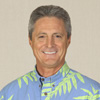
Timothy E. Johns (Chair)
State of Hawaiʻi Representative
2001 - Present
"We really are only on this earth for a short time and so the work that you do should be important work. Of all the things I have done in my career, helping to protect the Northwestern Hawaiian Islands will stand out. I know we have left a legacy for future generations."
Timothy Johns is very active in environmental, educational, and social issues in Hawaiʻi. In addition to being Chair of the Northwestern Hawaiian Islands Coral Reef Ecosystem Reserve Advisory Council, he was appointed by President Obama to the post of United States Commissioner, Commission for the Conservation and Management of Highly Migratory Fish Stocks in the Western and Central Pacific Ocean. His memberships have included: United States Senate Curatorial Advisory Board; Rotary Club of Honolulu; Parker Ranch Foundation Trust; Hawaiian Electric Company, Inc.; Grove Farm Company, Inc.; YMCA of Honolulu; Hawaiʻi Nature Center; St. Andrew's Priory School; Diamond Head Theatre; Bishop Museum, PBS Hawaiʻi; Hawaiʻi Historic Foundation; Kualoa Ranch; Trust for Public Land; Catholic Charities Hawaiʻi, and Mental Health America of Hawaiʻi.
Timothy is currently Senior Vice President at HMSA, and was President, Director, and Chief Executive Officer of the Bishop Museum from 2007 - 2011. Previously he served as Chief Operating Officer for the Estate of Samuel Mills Damon, Chair of the State Department of Land and Natural Resources, Vice President and General Counsel for AMFAC Property Development Corporation, lecturer in business law at the University of Hawaiʻi and Windward Community College, and Director of Land Protection with the Nature Conservancy of Hawaiʻi. Timothy holds a Bachelor's degree with honors in history and business economics from the University of California, Santa Barbara, and a Master's degree in economics and Juris Doctor from the University of Southern California.
State of Hawaiʻi Representative
2001 - Present
"We really are only on this earth for a short time and so the work that you do should be important work. Of all the things I have done in my career, helping to protect the Northwestern Hawaiian Islands will stand out. I know we have left a legacy for future generations."
abcdefghijklmnopqrstuvwxyzabcdefghijklmnopqrstuvwxyzabcdefghijklmnopqrstuvwxyz
Timothy Johns is very active in environmental, educational, and social issues in Hawaiʻi. In addition to being Chair of the Northwestern Hawaiian Islands Coral Reef Ecosystem Reserve Advisory Council, he was appointed by President Obama to the post of United States Commissioner, Commission for the Conservation and Management of Highly Migratory Fish Stocks in the Western and Central Pacific Ocean. His memberships have included: United States Senate Curatorial Advisory Board; Rotary Club of Honolulu; Parker Ranch Foundation Trust; Hawaiian Electric Company, Inc.; Grove Farm Company, Inc.; YMCA of Honolulu; Hawaiʻi Nature Center; St. Andrew's Priory School; Diamond Head Theatre; Bishop Museum, PBS Hawaiʻi; Hawaiʻi Historic Foundation; Kualoa Ranch; Trust for Public Land; Catholic Charities Hawaiʻi, and Mental Health America of Hawaiʻi.
Timothy is currently Senior Vice President at HMSA, and was President, Director, and Chief Executive Officer of the Bishop Museum from 2007 - 2011. Previously he served as Chief Operating Officer for the Estate of Samuel Mills Damon, Chair of the State Department of Land and Natural Resources, Vice President and General Counsel for AMFAC Property Development Corporation, lecturer in business law at the University of Hawaiʻi and Windward Community College, and Director of Land Protection with the Nature Conservancy of Hawaiʻi. Timothy holds a Bachelor's degree with honors in history and business economics from the University of California, Santa Barbara, and a Master's degree in economics and Juris Doctor from the University of Southern California.

Linda Paul (Vice-Chair)
Conservation Representative
2001 - Present
"Oceanic refuges that span large geographic distances are needed to protect marine communities from catastrophic events and to provide stable platforms for biological diversity to flourish. The Northwestern Hawaiian Islands encompass the most remote
Linda Paul is a long-time advocate for the preservation and protection of the Northwestern Hawaiian Islands. She has coauthored videos, developed marketing materials, conducted numerous media interviews, and given countless presentations about the NWHI. She also initiated the application process supporting the nomination of the Northwestern Hawaiian Islands as a United Nations Educational, Scientific and Cultural Organization (UNSECO) World Heritage Site. For her tireless work, Linda was honored as the National Marine Sanctuary Foundation Volunteer of the Year Award in 2006.
Paul's interest in ocean issues and passion for the Northwestern Hawaiian Islands began when she was a graduate zoology student studying lobsters, focusing on the endemic Hawaiian spiny lobster. During this time she ventured on research vessels to the Northwestern Hawaiian Islands to collect adult and juvenile species.
In addition to being Vice-Chair of the Northwestern Hawaiian Islands Coral Reef Ecosystem Reserve Advisory Council since 2003, Linda became the Executive Director for Aquatics for the Hawaiʻi Audubon Society after volunteering with that organization for years. Her memberships also include Project Director of Pacific Fisheries Coalition and Director of the Ocean Law & Policy Institute, Pacific Forum.
Linda has a Master's in Zoology from the University of Hawaiʻi and a Juris Doctor from UH's Richardson School of Law.
Conservation Representative
2001 - Present
"Oceanic refuges that span large geographic distances are needed to protect marine communities from catastrophic events and to provide stable platforms for biological diversity to flourish. The Northwestern Hawaiian Islands encompass the most remote
abcdefghijklmnopqrstuvwxyzabcdefghijklmnopqrstuvwxyzabcdefghijklmnopqrstuvwxyzlarge-scale coral reef system in the world. I'm glad to have been part of the effort that resulted in the protection of one of the last wild places on earth. Let's keep it that way."
Linda Paul is a long-time advocate for the preservation and protection of the Northwestern Hawaiian Islands. She has coauthored videos, developed marketing materials, conducted numerous media interviews, and given countless presentations about the NWHI. She also initiated the application process supporting the nomination of the Northwestern Hawaiian Islands as a United Nations Educational, Scientific and Cultural Organization (UNSECO) World Heritage Site. For her tireless work, Linda was honored as the National Marine Sanctuary Foundation Volunteer of the Year Award in 2006.
Paul's interest in ocean issues and passion for the Northwestern Hawaiian Islands began when she was a graduate zoology student studying lobsters, focusing on the endemic Hawaiian spiny lobster. During this time she ventured on research vessels to the Northwestern Hawaiian Islands to collect adult and juvenile species.
In addition to being Vice-Chair of the Northwestern Hawaiian Islands Coral Reef Ecosystem Reserve Advisory Council since 2003, Linda became the Executive Director for Aquatics for the Hawaiʻi Audubon Society after volunteering with that organization for years. Her memberships also include Project Director of Pacific Fisheries Coalition and Director of the Ocean Law & Policy Institute, Pacific Forum.
Linda has a Master's in Zoology from the University of Hawaiʻi and a Juris Doctor from UH's Richardson School of Law.
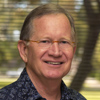
Kem Lowry, Ph.D. (Secretary)
Citizen-At-Large Representative
2003 - Present
"The Northwestern Hawaiian Islands Coral Reef Ecosystem Reserve is one of the most important initiatives in large marine ecosystem management in the world. It is a privilege to be involved in this extraordinary experiment in marine resource management."
Kem Lowry is a professor at the University of Hawaiʻi and an Adjunct Senior Fellow at the East-West Center. He previously served as Chair of UH's Department of Urban and Regional Planning and Director of the Conflict Resolution Program. Kem has been a visiting scholar at the Institute for International Relations and Development in Asia at Sophia University in Tokyo, a visiting faculty at the Department of City and Regional Planning at the University of North Carolina, and a Pew Fellow at the Marine Policy Program of Woods Hole Oceanographic Institution.
In addition to being Secretary of the Northwestern Hawaiian Islands Coral Reef Ecosystem Reserve Advisory Council, his memberships include the Advisory Board of the Center on Alternative Dispute Resolution, Hawaiʻi State Judiciary, and the Advisory Council of the Queen Liliʻuokalani Children's Center. Kem has also served on the editorial boards of the American Planning Association Journal and the Journal of Ocean and Coastal Management.
Kem has served as a consultant to state agencies and nonprofit organizations in Hawaiʻi, the United Nations Development Program, the U.S. Agency for International Development, the U.S. Congress Office of Technology Assessment, the Packard Foundation, UNICEF-China, the Asia Foundation, and the Partnership for the Management of the Seas of Asia. He has published numerous articles on planning and environmental management, coastal management and evaluation in various journals.
Kem was a Peace Corps Volunteer in Malaysia, and has a Ph.D. in Political Science from the University of Hawaiʻi. He has designed and participated in training programs and workshops on coastal management, evaluation and environmental mediation in Indonesia, Malaysia, Sri Lanka, China, the Philippines, Thailand, and elsewhere.
Citizen-At-Large Representative
2003 - Present
"The Northwestern Hawaiian Islands Coral Reef Ecosystem Reserve is one of the most important initiatives in large marine ecosystem management in the world. It is a privilege to be involved in this extraordinary experiment in marine resource management."
abcdefghijklmnopqrstuvwxyzabcdefghijklmnopqrstuvwxyzabcdefghijklmnopqrstuvwxyz
Kem Lowry is a professor at the University of Hawaiʻi and an Adjunct Senior Fellow at the East-West Center. He previously served as Chair of UH's Department of Urban and Regional Planning and Director of the Conflict Resolution Program. Kem has been a visiting scholar at the Institute for International Relations and Development in Asia at Sophia University in Tokyo, a visiting faculty at the Department of City and Regional Planning at the University of North Carolina, and a Pew Fellow at the Marine Policy Program of Woods Hole Oceanographic Institution.
In addition to being Secretary of the Northwestern Hawaiian Islands Coral Reef Ecosystem Reserve Advisory Council, his memberships include the Advisory Board of the Center on Alternative Dispute Resolution, Hawaiʻi State Judiciary, and the Advisory Council of the Queen Liliʻuokalani Children's Center. Kem has also served on the editorial boards of the American Planning Association Journal and the Journal of Ocean and Coastal Management.
Kem has served as a consultant to state agencies and nonprofit organizations in Hawaiʻi, the United Nations Development Program, the U.S. Agency for International Development, the U.S. Congress Office of Technology Assessment, the Packard Foundation, UNICEF-China, the Asia Foundation, and the Partnership for the Management of the Seas of Asia. He has published numerous articles on planning and environmental management, coastal management and evaluation in various journals.
Kem was a Peace Corps Volunteer in Malaysia, and has a Ph.D. in Political Science from the University of Hawaiʻi. He has designed and participated in training programs and workshops on coastal management, evaluation and environmental mediation in Indonesia, Malaysia, Sri Lanka, China, the Philippines, Thailand, and elsewhere.
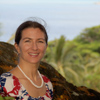
Jessica Wooley
Conservation Representative
2001 - Present
"I wanted to do what I could to protect and better manage our ocean resources, and I was privileged and lucky enough to volunteer and be selected to help."
Jessica Wooley has been a Representative in the Hawaiʻi State
Jessica holds a Juris Doctor from Boalt Hall School of Law, University of California at Berkeley, and a Master's degree in Agricultural and Resource Economics from the University of California at Berkeley.
In addition to being a member of the Reserve Advisory Council for the Northwest Hawaiian Islands since 2001, her memberships have included O'ahu Land Trust, Hawaiʻi Bicycling League, One Voice for Livable Islands, and AARP.
Conservation Representative
2001 - Present
"I wanted to do what I could to protect and better manage our ocean resources, and I was privileged and lucky enough to volunteer and be selected to help."
Jessica Wooley has been a Representative in the Hawaiʻi State
abcdefghijklmnopqrstuvwxyzabcdefghijklmnopqrstuvwxyzabcdefghijklmnopqrstuvwxyzabcdefghijklmnopqrstuvwxyzabcdefghijklmnopqrstuvwxyzHouse of Representatives since 2008. She was the State Convention Delegate for the Hawaiʻi Democratic Party in 2008. She previously served as Deputy Attorney General for the State of Hawaiʻi Department of the Attorney General, Attorney for the Legal Aid Society of Hawaiʻi, and a Research Associate with the University of Hawaiʻi at Manoa.
Jessica holds a Juris Doctor from Boalt Hall School of Law, University of California at Berkeley, and a Master's degree in Agricultural and Resource Economics from the University of California at Berkeley.
In addition to being a member of the Reserve Advisory Council for the Northwest Hawaiian Islands since 2001, her memberships have included O'ahu Land Trust, Hawaiʻi Bicycling League, One Voice for Livable Islands, and AARP.
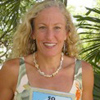
Gail Grabowsky
Education Representative
2001 - Present
"Papahānaumokuākea is such a unique and magnificent place of thriving ecosystems and Hawaiian cultural meaning. The other Council members are wise and prudent and the place so important that it has been a joy serving and helping advise Monument
Gail Grabowsky is an Associate Professor and Director of the Environmental Studies program at Chaminade University. Her special interests include developmental and evolutionary biology, invertebrate zoology, ecology, biomechanics, and environmental science.
Gail has studied albatross mating behavior and worked to decrease the incidental catch of albatrosses in longline fishing gear. She has also conducted terrestrial restoration ecology work with her students for The Nature Conservancy and the Ala Wai Mauka Watershed Restoration Project. Gail has investigated whether certain species of sea urchin will eat some of Hawaiʻi's invasive alien algae species and researches box jellyfish strandings on Oʻahu's shores. She is interested in conducting salt-water aquarium fish aquaculture research with the aim to help protect wild reef fish.
In addition to serving on the Northwestern Hawaiian Islands Coral Reef Ecosystem Reserve Advisory Council, her other affiliations include the State Environmental Council, the Pacific Symposium for Science and Sustainability, the Western Pacific Regional Fishery Management Council, and the Hawaiʻi Academy of Science.
Gail holds a Ph.D. from Duke University and has won awards for her teaching, research and community service. She is also competitive paddler and champion rough-water swimmer. Gail continues to inspire people to take action to help the environment; on Earth Day April 2007 her book "50 Simple Things You Can Do to Save Hawaiʻi" was published.
Education Representative
2001 - Present
"Papahānaumokuākea is such a unique and magnificent place of thriving ecosystems and Hawaiian cultural meaning. The other Council members are wise and prudent and the place so important that it has been a joy serving and helping advise Monument
abcdefghijklmnopqrstuvwxyzabcdefghijklmnopqrstuvwxyzabcdefghijklmnopqrstuvwxyzabcdefghijklmnopqrstuvwxyzStaff. Every effort made to educate people about the public trust that is Papahānaumokuākea increases their awareness of what a precious place it is and ensures its future protection."
Gail Grabowsky is an Associate Professor and Director of the Environmental Studies program at Chaminade University. Her special interests include developmental and evolutionary biology, invertebrate zoology, ecology, biomechanics, and environmental science.
Gail has studied albatross mating behavior and worked to decrease the incidental catch of albatrosses in longline fishing gear. She has also conducted terrestrial restoration ecology work with her students for The Nature Conservancy and the Ala Wai Mauka Watershed Restoration Project. Gail has investigated whether certain species of sea urchin will eat some of Hawaiʻi's invasive alien algae species and researches box jellyfish strandings on Oʻahu's shores. She is interested in conducting salt-water aquarium fish aquaculture research with the aim to help protect wild reef fish.
In addition to serving on the Northwestern Hawaiian Islands Coral Reef Ecosystem Reserve Advisory Council, her other affiliations include the State Environmental Council, the Pacific Symposium for Science and Sustainability, the Western Pacific Regional Fishery Management Council, and the Hawaiʻi Academy of Science.
Gail holds a Ph.D. from Duke University and has won awards for her teaching, research and community service. She is also competitive paddler and champion rough-water swimmer. Gail continues to inspire people to take action to help the environment; on Earth Day April 2007 her book "50 Simple Things You Can Do to Save Hawaiʻi" was published.
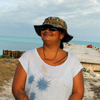
Pelika Andrade
Native Hawaiian Representative
2012 - Present
"My first trip in 2008 to Pihemanu.... Kuaihelani... Midway Atoll opened my eyes to the extent and expanse of our Hawaiian universe, but more importantly has awoken an awareness and responsibility that I have accepted and will pass on to my children
A native Hawaiian born and raised on the island of Kauaʻi, Pelika Bertlemann says that caring for the islands and oceans has been a part of her family life from a very young age. She has been involved with many organizations and projects working to better our relationship with the environment through conservation efforts and lifestyle changes. For the past five years, she has been working to develop alternate approaches to monitor Hawaiʻi's shoreline and implement a management strategy that supports a healthy, balanced environment.
Pelika is currently Program Coordinator of the Keaholoa STEM Scholars Program at UH Hilo. She was previously Education Specialist for Hawaiʻi Community College's Digital Media Arts Program and Project Coordinator at Na Kalai Waʻa (Moku o Hawaiʻi), a non-profit organization that conducts community educational programs utilizing Hawaiian voyaging and non-instrument navigation as its foundation.
Pelika has a varied background in education, research, fishing, conservation, and business, and participates in many workshops and conferences related to conservation. She has lectured on topics ranging from voyaging, Hawaiian plants and their uses, to digital media arts. In addition to her role on the NWHICRER Advisory Council, her other memberships include OHA Native Hawaiian Working Group for PMNM, Nā Maka 'o Papahānaumokuākea, and Punana Leo o Waimea, and is a crewmember on the Makalii Voyaging Canoe based in Kawaihae, Hawaiʻi Island.
Pelika attended Kamehameha School and holds a Bachelor's Degree in Hawaiian Studies from UH Hilo and a Master's Degree in Hawaiian Studies from the University of Hawaiʻi at Mānoa. She has visited the NWHI on two occasions to conduct scientific and cultural research, once to Midway in 2008 for 10 days and once to Nihoa, Moku Manamana, and French Frigate Shoals in 2010 for 10 days.
Native Hawaiian Representative
2012 - Present
"My first trip in 2008 to Pihemanu.... Kuaihelani... Midway Atoll opened my eyes to the extent and expanse of our Hawaiian universe, but more importantly has awoken an awareness and responsibility that I have accepted and will pass on to my children
abcdefghijklmnopqrstuvwxyzabcdefghijklmnopqrstuvwxyzabcdefghijklmnopqrstuvwxyzabcdefghijklmnopqrstuvwxyzand theirs. Our kupuna islands, our realm of po, contains countless treasures for us as kanaka and as citizens of our global community. It is in this realm that we are born from and return to. Our heroes have become famous for their travels there and that tradition continues to this day. The North Western Hawaiian Island are where our eldest of kupuna reside and continue to thrive... our corals and reef systems, fish, plants and birds. I feel both honored and privileged to be a contributing part of caring for our islands, our elder siblings, and ensuring a healthy-thriving pae'aina (archipelago) for future generations."
A native Hawaiian born and raised on the island of Kauaʻi, Pelika Bertlemann says that caring for the islands and oceans has been a part of her family life from a very young age. She has been involved with many organizations and projects working to better our relationship with the environment through conservation efforts and lifestyle changes. For the past five years, she has been working to develop alternate approaches to monitor Hawaiʻi's shoreline and implement a management strategy that supports a healthy, balanced environment.
Pelika is currently Program Coordinator of the Keaholoa STEM Scholars Program at UH Hilo. She was previously Education Specialist for Hawaiʻi Community College's Digital Media Arts Program and Project Coordinator at Na Kalai Waʻa (Moku o Hawaiʻi), a non-profit organization that conducts community educational programs utilizing Hawaiian voyaging and non-instrument navigation as its foundation.
Pelika has a varied background in education, research, fishing, conservation, and business, and participates in many workshops and conferences related to conservation. She has lectured on topics ranging from voyaging, Hawaiian plants and their uses, to digital media arts. In addition to her role on the NWHICRER Advisory Council, her other memberships include OHA Native Hawaiian Working Group for PMNM, Nā Maka 'o Papahānaumokuākea, and Punana Leo o Waimea, and is a crewmember on the Makalii Voyaging Canoe based in Kawaihae, Hawaiʻi Island.
Pelika attended Kamehameha School and holds a Bachelor's Degree in Hawaiian Studies from UH Hilo and a Master's Degree in Hawaiian Studies from the University of Hawaiʻi at Mānoa. She has visited the NWHI on two occasions to conduct scientific and cultural research, once to Midway in 2008 for 10 days and once to Nihoa, Moku Manamana, and French Frigate Shoals in 2010 for 10 days.
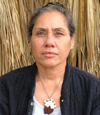
Tammy Harp
Native Hawaiian Representative
2001 - Present
"The endangered Hawaiian monk seal and the threatened honu have been in existence since time immemorial, the initial inhabitants of the Hawaiian Islands Archipelago. We humans are the alien species; we are the future ancestors and how we behave presently will determine the outcome for those we leave behind."
A native Hawaiian, Tammy Harp has worked tirelessly to preserve and promote Native Hawaiian culture. Tammy is a life-long shoreline gatherer, having learned from her mother and her grandparents' generation while growing up in Lāhaina and through her father's stories about the past.
Tammy served on the Native and Indigenous Rights Advisory Council of WESTPAC. She got involved with the Monument because of her concern for monk seal and lobster fishery management in the late 1990s. Holding a great aloha for the monk seals, which she feels deserve a chance at survival, Tammy hopes to dispel the bulk of misinformation and exaggeration about monk seals by engaging in honest dialogue with marine resource users.
In addition to her role on the NWHICRER Advisory Council, Tammy's other memberships include Makani Hou o Kaloko-Honokohau, Na Kupuna Moku o Keawe, Hui of Hawaiians, Na Kupuna O Maui (The Elders of Maui), Mala Wharf Fishing and Recreational Association, Focus Maui Nui. Past memberships include Lahaina Open Space Society and Maui Hawaiian Agencies and Organizations. She has attended various conferences, sat on numerous panels and participated in many public hearings pertaining to marine resource and Hawaiian culture preservation.
Although Tammy has never been to the NWHI, she feels she can aloha them from a distance, believing that it is important to have a purpose to access this special place. She prefers to practice mālama ʻāina of the NWHI from home, which also needs caring for. Tammy also seeks to spread knowledge that Hawaiʻi is all the islands from the Big Island in the south to Kure in the far north.
Native Hawaiian Representative
2001 - Present
"The endangered Hawaiian monk seal and the threatened honu have been in existence since time immemorial, the initial inhabitants of the Hawaiian Islands Archipelago. We humans are the alien species; we are the future ancestors and how we behave presently will determine the outcome for those we leave behind."
abcdefghijklmnopqrstuvwxyzabcdefghijklmnopqrstuvwxyz
A native Hawaiian, Tammy Harp has worked tirelessly to preserve and promote Native Hawaiian culture. Tammy is a life-long shoreline gatherer, having learned from her mother and her grandparents' generation while growing up in Lāhaina and through her father's stories about the past.
Tammy served on the Native and Indigenous Rights Advisory Council of WESTPAC. She got involved with the Monument because of her concern for monk seal and lobster fishery management in the late 1990s. Holding a great aloha for the monk seals, which she feels deserve a chance at survival, Tammy hopes to dispel the bulk of misinformation and exaggeration about monk seals by engaging in honest dialogue with marine resource users.
In addition to her role on the NWHICRER Advisory Council, Tammy's other memberships include Makani Hou o Kaloko-Honokohau, Na Kupuna Moku o Keawe, Hui of Hawaiians, Na Kupuna O Maui (The Elders of Maui), Mala Wharf Fishing and Recreational Association, Focus Maui Nui. Past memberships include Lahaina Open Space Society and Maui Hawaiian Agencies and Organizations. She has attended various conferences, sat on numerous panels and participated in many public hearings pertaining to marine resource and Hawaiian culture preservation.
Although Tammy has never been to the NWHI, she feels she can aloha them from a distance, believing that it is important to have a purpose to access this special place. She prefers to practice mālama ʻāina of the NWHI from home, which also needs caring for. Tammy also seeks to spread knowledge that Hawaiʻi is all the islands from the Big Island in the south to Kure in the far north.
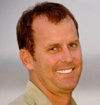
Richard Lee
Ocean-Related Tourism Representative
2012 - Present
"We should work to protect the Monument from adverse impacts that would diminish the land and marine ecosystems and work to restore these ecosystems to their natural state, and to create a perception of value in the community to support the Monument in perpetuity."
Born and raised in Honolulu, Rick Lee is dedicated to educating people about the Hawaiian Islands and its marine ecosystems. Rick has over twenty years of professional experience with hospitality, eco-tourism, and recreation, both in the US and abroad. Currently an Advisor with Commercial Real Estate Services in Honolulu, he previously held positions with Marabou, Bank of Hawaii and Outrigger Canoe Club.
Rick has developed properties in isolated areas of the Pacific, New Zealand, Russia, Argentina, Chile, and the American West, and has worked with a number of scientific programs associated with resource management in these destinations. A US Coast Guard Credentialed Captain, he also owns an eco-tourism business in Honolulu that provides guided fly fishing with a focus on catch and release.
Rick attended Punahou School, The University of Utah, and Cornell University, where he earned a Master's Degree in Hotel Management with an emphasis in Eco-Tourism Development.
Ocean-Related Tourism Representative
2012 - Present
"We should work to protect the Monument from adverse impacts that would diminish the land and marine ecosystems and work to restore these ecosystems to their natural state, and to create a perception of value in the community to support the Monument in perpetuity."
abcdefghijklmnopqrstuvwxyzabcdefghijklmnopqrstuvwxyzabcdefghijklmnopqrstuvwxyzabcdefghijklmnopqrstuvwxyz
Born and raised in Honolulu, Rick Lee is dedicated to educating people about the Hawaiian Islands and its marine ecosystems. Rick has over twenty years of professional experience with hospitality, eco-tourism, and recreation, both in the US and abroad. Currently an Advisor with Commercial Real Estate Services in Honolulu, he previously held positions with Marabou, Bank of Hawaii and Outrigger Canoe Club.
Rick has developed properties in isolated areas of the Pacific, New Zealand, Russia, Argentina, Chile, and the American West, and has worked with a number of scientific programs associated with resource management in these destinations. A US Coast Guard Credentialed Captain, he also owns an eco-tourism business in Honolulu that provides guided fly fishing with a focus on catch and release.
Rick attended Punahou School, The University of Utah, and Cornell University, where he earned a Master's Degree in Hotel Management with an emphasis in Eco-Tourism Development.
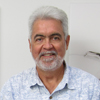
Rick Gaffney
Recreational Fishing Representative
2001 - Present
"The Northwest Hawaiian Islands are home to the most extraordinary marine ecosystem on the planet, and it is an honor and a privilege to be involved in the preservation and management of one of the most unsullied, unique and beautiful places
Rick Gaffney has long been actively involved in the politics of fishery management and marine protected area. Born and raised in Hawaiʻi, Rick grew up boating, surfing, fishing, sailing and diving in island waters.
After graduating from Oregon State University and serving in the Navy, Rick earned his USCG Captain's license in Kona. He was one the first Sea Grant Marine Advisory Specialists in the Pacific, based on Maui, where he later operated a series of sport fishing charter boats. He first visited the Northwest Hawaiian Islands in 1996, and later helped to manage the sport fishing and diving operations on Midway. Rick is now President and Managing Broker for Pacific Boats & Yachts on the Big Island, and works as an ocean recreation development consultant.
In addition to his role on the NWHICRER Advisory Council, Rick is President of the Hawaiʻi Fishing and Boating Association, Central Pacific Islands Representative-at-Large for the International Game Fishing Association, a member of the Hawaiian Islands Humpback Whale National Marine Sanctuary Advisory Committee and he has served as Co-Chair of the West Hawaiʻi Fisheries Council, and a member of the federal Marine Protected Areas Federal Advisory Committee.
Rick has written many articles on sport fishing, diving, boating and ocean recreational travel from all over the world, earning him international recognition as a chronicler of game fishing and boating, as well as two national writing awards and a marine environmental journalism fellowship.
Recreational Fishing Representative
2001 - Present
"The Northwest Hawaiian Islands are home to the most extraordinary marine ecosystem on the planet, and it is an honor and a privilege to be involved in the preservation and management of one of the most unsullied, unique and beautiful places
abcdefghijklmnopqrstuvwxyzabcdefghijklmnopqrstuvwxyzabcdefghijklmnopqrstuvwxyzabcdefghijklmnopqrstuvwxyzon earth."
Rick Gaffney has long been actively involved in the politics of fishery management and marine protected area. Born and raised in Hawaiʻi, Rick grew up boating, surfing, fishing, sailing and diving in island waters.
After graduating from Oregon State University and serving in the Navy, Rick earned his USCG Captain's license in Kona. He was one the first Sea Grant Marine Advisory Specialists in the Pacific, based on Maui, where he later operated a series of sport fishing charter boats. He first visited the Northwest Hawaiian Islands in 1996, and later helped to manage the sport fishing and diving operations on Midway. Rick is now President and Managing Broker for Pacific Boats & Yachts on the Big Island, and works as an ocean recreation development consultant.
In addition to his role on the NWHICRER Advisory Council, Rick is President of the Hawaiʻi Fishing and Boating Association, Central Pacific Islands Representative-at-Large for the International Game Fishing Association, a member of the Hawaiian Islands Humpback Whale National Marine Sanctuary Advisory Committee and he has served as Co-Chair of the West Hawaiʻi Fisheries Council, and a member of the federal Marine Protected Areas Federal Advisory Committee.
Rick has written many articles on sport fishing, diving, boating and ocean recreational travel from all over the world, earning him international recognition as a chronicler of game fishing and boating, as well as two national writing awards and a marine environmental journalism fellowship.
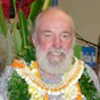
Bill Gilmartin
Research Representative
2001 - Present
"The Northwestern Hawaiian Islands includes some of the outstanding wild places left on the planet and has special meaning to me having spent much of my career using the plight of the monk seal to bring attention to protections needed. I consider it a great
Bill Gilmartin is a long-time advocate for marine and environmental protection in Hawaiʻi. A biologist with the federal government for nearly 30 years, Bill studied many marine mammal species and spent 16 years managing the Research and Recovery Program for the endangered Hawaiian monk seal.
In addition to serving on the NWHI Coral Reef Ecosystem Reserve Advisory Council, his other memberships include the Society for Marine Mammology, the IUCN Seal Specialist Group, and the Kure Atoll Conservancy.
Bill began studying Hawaiian monk seals in 1978, investigating die-offs on Laysan Island in the Northwestern Hawaiian Islands. He worked with the National Marine Fisheries Service from 1980 until his retirement in 1995, and was part of the Monk Seal Recovery Team, of which he is still a member. In 1994, Gilmartin and his team relocated 21 adult males to the main Hawaiian Islands to prevent aggressive "mobbing" behavior during breeding season that sometimes injures or kills breeding females.
Following his "retirement" from NMFS, Bill co-rounded the Hawaiʻi Wildlife Fund in 1996, primarily to address gaps in recovery efforts for endangered hawksbill turtles and monk seals. As co-founder and Director of Research of Hawaiʻi Wildlife Fund, Bill conducts research and recovery projects for Hawaiʻi's endangered hawksbill turtle, organizes community shoreline marine debris cleanup events on Hawaiʻi Island's southeast Kaʻu coast, and manages an anchialine pool (cenote) restoration project. He believes that partnership with the community is key.
Research Representative
2001 - Present
"The Northwestern Hawaiian Islands includes some of the outstanding wild places left on the planet and has special meaning to me having spent much of my career using the plight of the monk seal to bring attention to protections needed. I consider it a great
abcdefghijklmnopqrstuvwxyzabcdefghijklmnopqrstuvwxyzabcdefghijklmnopqrstuvwxyzabcdefghijklmnopqrstuvwxyzhonor to be a member of the Advisory Council and contribute with this group to the restoration, preservation and management of this incredible place for the enjoyment of future generations, even if from a distance."
Bill Gilmartin is a long-time advocate for marine and environmental protection in Hawaiʻi. A biologist with the federal government for nearly 30 years, Bill studied many marine mammal species and spent 16 years managing the Research and Recovery Program for the endangered Hawaiian monk seal.
In addition to serving on the NWHI Coral Reef Ecosystem Reserve Advisory Council, his other memberships include the Society for Marine Mammology, the IUCN Seal Specialist Group, and the Kure Atoll Conservancy.
Bill began studying Hawaiian monk seals in 1978, investigating die-offs on Laysan Island in the Northwestern Hawaiian Islands. He worked with the National Marine Fisheries Service from 1980 until his retirement in 1995, and was part of the Monk Seal Recovery Team, of which he is still a member. In 1994, Gilmartin and his team relocated 21 adult males to the main Hawaiian Islands to prevent aggressive "mobbing" behavior during breeding season that sometimes injures or kills breeding females.
Following his "retirement" from NMFS, Bill co-rounded the Hawaiʻi Wildlife Fund in 1996, primarily to address gaps in recovery efforts for endangered hawksbill turtles and monk seals. As co-founder and Director of Research of Hawaiʻi Wildlife Fund, Bill conducts research and recovery projects for Hawaiʻi's endangered hawksbill turtle, organizes community shoreline marine debris cleanup events on Hawaiʻi Island's southeast Kaʻu coast, and manages an anchialine pool (cenote) restoration project. He believes that partnership with the community is key.

Cindy Hunter
Research Representative
2001 - Present
"I have been involved as a voice in education and research on the RAC since 2000. I've made just one journey to what is now Papahanaumokuakea MNM, with the "Boatload of Educators" in 2005. As an advocate for conservation of this exceptional
Cindy Hunter is Director, Marine Option Program and Assistant Professor of Marine Biology at the University of Hawaiʻi. The Marine Option Program is an educational program within the University of Hawaiʻi that offers a unique opportunity for students in any field of study who have an interest in the ocean, and provides a clearinghouse for marine-oriented education and employment opportunities and a chance for students to network with professionals who are involved with the marine field.
Cindy's areas of research interest include conservation biology, coral reef ecology, biology and ecology of marine invertebrates and fishes (reproduction, genetics, population structure), physiology and molecular biology of cnidarian-algal symbioses, evolutionary genetics, invertebrate systematics, community processes and dynamics, and Hawaiian natural history. Her projects include ecology of alien algae on coral reefs, shifting the competitive advantage back to native species on Hawaiʻi's reefs, and growth and morphology of corals.
Cindy has a Ph.D. in Zoology from the University of Hawaiʻi. In addition to her seat on the NWHICRER Advisory Council, she is a member of Aquaculture Hub, where her interests are in herbivores that can help to control alien seaweeds.
Research Representative
2001 - Present
"I have been involved as a voice in education and research on the RAC since 2000. I've made just one journey to what is now Papahanaumokuakea MNM, with the "Boatload of Educators" in 2005. As an advocate for conservation of this exceptional
abcdefghijklmnopqrstuvwxyzabcdefghijklmnopqrstuvwxyzabcdefghijklmnopqrstuvwxyzabcdefghijklmnopqrstuvwxyzpu'u honua, I strongly believe in "bringing the place to the people."
Cindy Hunter is Director, Marine Option Program and Assistant Professor of Marine Biology at the University of Hawaiʻi. The Marine Option Program is an educational program within the University of Hawaiʻi that offers a unique opportunity for students in any field of study who have an interest in the ocean, and provides a clearinghouse for marine-oriented education and employment opportunities and a chance for students to network with professionals who are involved with the marine field.
Cindy's areas of research interest include conservation biology, coral reef ecology, biology and ecology of marine invertebrates and fishes (reproduction, genetics, population structure), physiology and molecular biology of cnidarian-algal symbioses, evolutionary genetics, invertebrate systematics, community processes and dynamics, and Hawaiian natural history. Her projects include ecology of alien algae on coral reefs, shifting the competitive advantage back to native species on Hawaiʻi's reefs, and growth and morphology of corals.
Cindy has a Ph.D. in Zoology from the University of Hawaiʻi. In addition to her seat on the NWHICRER Advisory Council, she is a member of Aquaculture Hub, where her interests are in herbivores that can help to control alien seaweeds.

Don Schug
Research Representative
2001 - Present
Don Schug has spent more than twenty years studying the economic and social aspects of fisheries and fisheries management at the community, national, and international levels. His doctoral research in Papua New Guinea entailed an ethnographic study of
Don's fisheries-related research and applied work has taken him to many places in the United States and abroad. He has worked extensively in the Pacific islands, including Polynesia (Hawaiʻi and American Samoa), Micronesia (Kiribati) and Melanesia (Papua New Guinea).
Don believes that solutions to many of our natural resource management problems can only be achieved through the integration of information from a range of scientific disciplines, including economics, biology, sociology, and anthropology. As a result, he especially enjoys working with a team of people that can provide a wide range of perspectives and skills.
Research Representative
2001 - Present
Don Schug has spent more than twenty years studying the economic and social aspects of fisheries and fisheries management at the community, national, and international levels. His doctoral research in Papua New Guinea entailed an ethnographic study of
abcdefghijklmnopqrstuvwxyzabcdefghijklmnopqrstuvwxyzabcdefghijklmnopqrstuvwxyzabcdefghijklmnopqrstuvwxyzartisanal fisheries in the Torres Strait, while his duties as an economic planner in American Samoa included monitoring changes in the highly industrialized U.S. tuna harvesting and processing sectors.
Don's fisheries-related research and applied work has taken him to many places in the United States and abroad. He has worked extensively in the Pacific islands, including Polynesia (Hawaiʻi and American Samoa), Micronesia (Kiribati) and Melanesia (Papua New Guinea).
Don believes that solutions to many of our natural resource management problems can only be achieved through the integration of information from a range of scientific disciplines, including economics, biology, sociology, and anthropology. As a result, he especially enjoys working with a team of people that can provide a wide range of perspectives and skills.
Vacant
Native Hawaiian Representative (Elder)
Native Hawaiian Representative (Elder)
Vacant
Commercial Fishing Representative
Commercial Fishing Representative
Vacant
Conservation Representative
Conservation Representative
Alternates
Sean Naleimaile
Citizen-At-Large Alternate
2003 - Present
Citizen-At-Large Alternate
2003 - Present
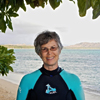
Judith Cucco
Conservation Alternate
2012 - Present
"I believe that we need to protect the full range and diversity of resources and habitats found throughout the Reserve by limiting consumptive activities, while continuing to allow activities that are compatible with resource protection and Native Hawaiian cultural practices. This will provide the opportunity for the Reserve to
Judith Cucco has had a lifelong interest in and love of the outdoors, the ocean and conservation. A retired teacher and marketing manager, Judith swims almost daily in Hanauma Bay (sometimes removing ghost nets and other marine debris), conducts fish surveys for the Reef Environmental Education Foundation (more than 260 to date), volunteers for Reef Watch Waikiki, and takes hula classes (which include Hawaiian language and cultural components).
While living in Waikiki (2005 - 2010), Judith independently did beach clean ups after her daily swim. Her presentation for a biology class at Kapiolani Community College was entitled "Human Impact on Coral at the Inner Reef of Hanauma Bay."
Judith has participated in numerous marine resource training and volunteer activities, including the International Marine Debris Conference, NOAA's Ocean Awareness training, Eyes of the Reef training, Hawaiian Islands Humpback Whale National Marine Sanctuary Count, and has served as an Interpretive Guide for the Hawaiʻi Institute of Marine Biology and a Conservation Education Intern for Dolphin Quest on Oʻahu.
Conservation Alternate
2012 - Present
"I believe that we need to protect the full range and diversity of resources and habitats found throughout the Reserve by limiting consumptive activities, while continuing to allow activities that are compatible with resource protection and Native Hawaiian cultural practices. This will provide the opportunity for the Reserve to
abcdefghijklmnopqrstuvwxyzabcdefghijklmnopqrstuvwxyzabcdefghijklmnopqrstuvwxyzevolve in a natural state, with a minimum of human influence."
Judith Cucco has had a lifelong interest in and love of the outdoors, the ocean and conservation. A retired teacher and marketing manager, Judith swims almost daily in Hanauma Bay (sometimes removing ghost nets and other marine debris), conducts fish surveys for the Reef Environmental Education Foundation (more than 260 to date), volunteers for Reef Watch Waikiki, and takes hula classes (which include Hawaiian language and cultural components).
While living in Waikiki (2005 - 2010), Judith independently did beach clean ups after her daily swim. Her presentation for a biology class at Kapiolani Community College was entitled "Human Impact on Coral at the Inner Reef of Hanauma Bay."
Judith has participated in numerous marine resource training and volunteer activities, including the International Marine Debris Conference, NOAA's Ocean Awareness training, Eyes of the Reef training, Hawaiian Islands Humpback Whale National Marine Sanctuary Count, and has served as an Interpretive Guide for the Hawaiʻi Institute of Marine Biology and a Conservation Education Intern for Dolphin Quest on Oʻahu.
Julie Leialoha
Conservation Alternate
2003 - Present
Conservation Alternate
2003 - Present
Carol Wilcox
Conservation Alternate
2001 - Present
Conservation Alternate
2001 - Present
Gail Clarke
Education Alternate
2003 - Present
Education Alternate
2003 - Present
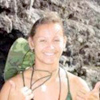
Bonnie Kahapea-Tanner
Native Hawaiian Alternate
2012 - Present
"Over the years I have seen with my own eyes the changes in the environment, both land and sea. I believe that a balance between the traditional Hawaiian management systems and modern research and resource management must be met in order for
Born and raised in Kaneohe on the windward side of Oʻahu, Bonnie Kahapea-Tanner is an experienced voyager. Recognizing that the ocean is our home, she is in tune to the subtle changes in the environment.
Bonnie is currently Project Director and Captain for Mana Maoli, a non-profit that provides educational opportunities for all ages, and lectures on Polynesian Voyaging at Winward Community College. She has served for the past five years as the Recreational Boating Representative on the Kaneohe Bay Regional Council, is an active member of ʻOhana Waʻa, and crew of the voyaging canoe Makalii. In 1999, Bonnie served as a watch captain on the E Mau voyage to Micronesia, sailing over 4000 miles with grand master navigator Mau Piailug.
Bonnie participated in the 2002 NOWRAMP expedition to Papahānaumokuākea and participated in the March 2012 Native Hawaiian Research Plan focus group. As a voyager, she brings her expertise in observation, close relationship with the elements, and the history of our kupuna visiting these islands.
Native Hawaiian Alternate
2012 - Present
"Over the years I have seen with my own eyes the changes in the environment, both land and sea. I believe that a balance between the traditional Hawaiian management systems and modern research and resource management must be met in order for
abcdefghijklmnopqrstuvwxyzabcdefghijklmnopqrstuvwxyzabcdefghijklmnopqrstuvwxyzabcdefghijklmnopqrstuvwxyzabcdefghijklmnopqrstuvwxyzPapahānaumokuākea to be protected and managed for the future."
Born and raised in Kaneohe on the windward side of Oʻahu, Bonnie Kahapea-Tanner is an experienced voyager. Recognizing that the ocean is our home, she is in tune to the subtle changes in the environment.
Bonnie is currently Project Director and Captain for Mana Maoli, a non-profit that provides educational opportunities for all ages, and lectures on Polynesian Voyaging at Winward Community College. She has served for the past five years as the Recreational Boating Representative on the Kaneohe Bay Regional Council, is an active member of ʻOhana Waʻa, and crew of the voyaging canoe Makalii. In 1999, Bonnie served as a watch captain on the E Mau voyage to Micronesia, sailing over 4000 miles with grand master navigator Mau Piailug.
Bonnie participated in the 2002 NOWRAMP expedition to Papahānaumokuākea and participated in the March 2012 Native Hawaiian Research Plan focus group. As a voyager, she brings her expertise in observation, close relationship with the elements, and the history of our kupuna visiting these islands.
Matt Zimmerman
Ocean-Related Tourism Alternate
2003 - Present
Ocean-Related Tourism Alternate
2003 - Present
Rick Hoo
Recreational Fishing Alternate
2003 - Present
Recreational Fishing Alternate
2003 - Present
Kanekoa Shultz
Research Alternate
2004 - Present
Research Alternate
2004 - Present
Bill Worcester
Research Alternate
2003 - Present
Research Alternate
2003 - Present
Vacant
Native Hawaiian Alternate (Elder)
Native Hawaiian Alternate (Elder)
Vacant
Native Hawaiian Alternate
Native Hawaiian Alternate
Vacant
Commercial Fishing Alternate
Commercial Fishing Alternate
Vacant
Research Alternate
Research Alternate
Non-voting representatives from the following agencies
Malia Chow
NOAA/Hawaiian Islands Humpback Whale National Marine Sanctuary
David W. Laist
Marine Mammal Commission
Michael Lesser
National Science Foundation
Eric Roberts
U.S. Coast Guard
Janice Fukawa
Department of Defense
Kitty Simonds
Western Pacific Regional Fishery Management Council
Matthew Brown
Department of the Interior (U.S. Fish and Wildlife Service)
Samantha Brooke
NOAA National Marine Fisheries Service
Athline Clark
NOAA/National Ocean Service/Office of National Marine Sanctuaries
Vacant
U.S. Department of State
